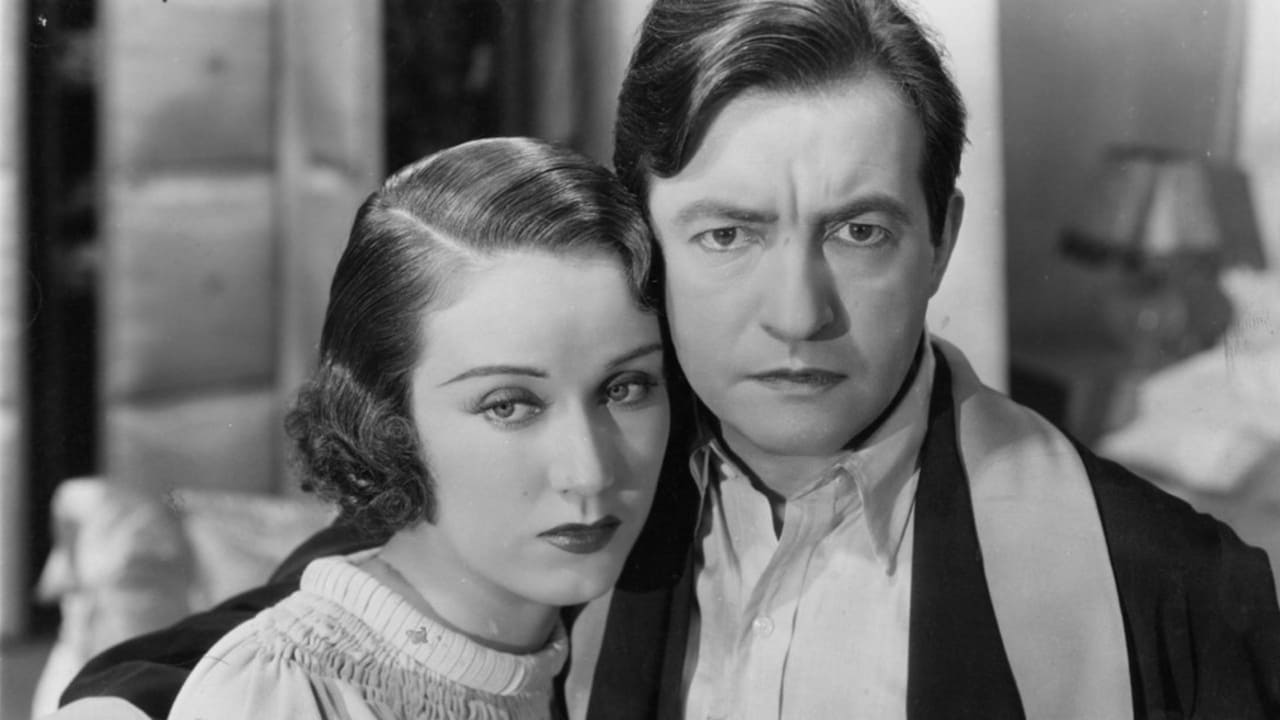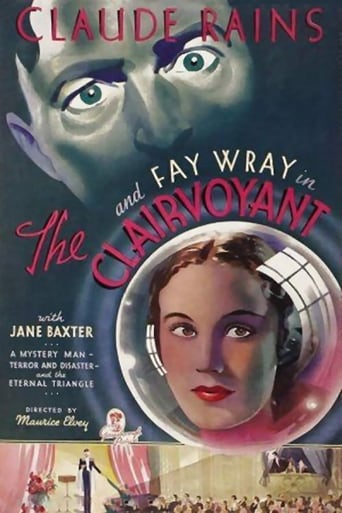robert-temple-1
This is a superb early film starring Claude Rains, where he gives a performance which is a true tour de force. In it, he plays a stage performer who does a music hall act as a clairvoyant, jointly with his wife, played by Fay Wray. The techniques used for faking the clairvoyant insights on stage are largely those used by Erik Jan Hanussen (1889-1933), Frederick Marion (real name Josef Kraus, born 1892 in Prague, who was known personally by a close friend of mine who assured me of his genuine abilities), and other famous clairvoyants for their stage shows, where the associate asks the blindfolded clairvoyant in a complex code whatever she is holding in her hand, which belongs to a member of the audience. However, Rains has occasional outbursts of genuine clairvoyance (as both Hanussen and Marion also did), something which his grandfather had also had, and which led to his ruin, says her other ominously. This film is based on a novel, of which I have long had a copy, by the Austrian writer Ernst Lothar (1890-1974) set in Germany and entitled DER HELLSEHER (THE CLAIRVOYANT), published in Berlin in 1929. The English translation by Beatrice Ryan came out in 1932, and the film was released two years later. The story in the film however is transposed from Germany to England, and greatly changed. There can be little doubt that Hanussen was the direct inspiration for this tale. Istvan Szabo made his film HANUSSEN in 1988 about the same man, who became Hitler's favourite clairvoyant but was murdered in 1933 by the Gestapo. Perhaps because he had written this revealing novel, Lothar became a banned author in Nazi Germany. Like Hanussen, Rains in the film starts as an obscure performer but through massive publicity becomes wealthy and influential. His fame commences when he correctly predicts a terrible train crash at Manchester, Then he predicts a Derby winner (in the novel it was the 'German Derby', though I know nothing about German racing and cannot say where such a race may have been held before the War, though I have never heard of a 'German Derby' in contemporary times), the odds on whom are 100 to 1. The horse wins, and the whole country becomes hysterical with awe and adulation for Rains. However, as with all clairvoyants, Rains cannot control his 'gift' and despite constant pleas to use it, he is powerless to turn it on and off, as it just comes unpredictably. That is why Madame Blavatsky had to fake things, because you cannot be a medium or a clairvoyant in fits and starts, you have to be continuous in order to satisfy the impatient and demanding public, and no clairvoyants have the ability to do that. The only solution is to intersperse the real thing with faked incidents, but then they are inevitably exposed and discredited. The character Christine, played by Jane Baxter, has a psychic resonance with Rains and when she is present, she triggers his genuine clairvoyant insights. When she is absent, he is rendered powerless in that respect. His wife naturally becomes very jealous, because Christine is highly attractive. Fay Wray, by birth a Canadian, manages a perfect English understatement in the film when, to express her obsessive love for her husband, she says to him while turned away from him: 'I'm rather in love with you.' How English can you get? It is amazing that she managed to get her upper lip unstiffened so that she could go on to appear in KING KONG. Perhaps she was saving her real emotions for a gorilla. Some girls are like that, and we normal guys will never understand what they see in such brutal, coarse and hairy types. (Nor will I ever understand why women like men with rough three-day stubble on their faces, considering how scratched they get when kissing such a creature. It must be some form of masochism which needs to be studied by psychologists. And speaking of ultra-submission, has anyone ever studied the writhing motions of Fay Wray and Jessica Lange when in the presence of King Kong? What does it mean?) But to return to the demure but insanely jealous Fay Wray of this film: one can't but notice how dark her hair is. Surely that is not the Fay Wray we thought we knew. Rains's mother in the film is played by Mary Clare, that great specialist in faces of doom. Here she moderates those talents but does manage some doom and gloom observations and some highly ominous looks, all very effective in building the tension. The film was directed by the talented Maurice Elvey, director of 196 films commencing in 1913, many of which are lost. Elvey often rose to great heights, as for instance in his HINDLE WAKES (aka FANNY HAWTHORNE, 1927) and his film of Stefan Zweig's novel BEWARE OF PITY (1946) where Lilli Palmer plays the girl in the wheelchair with perfect pathos. Here, Felix Aylmer plays the terrifying prosecutor when Rains is prosecuted for causing a mining disaster at Humber Tunnel for ostensibly causing panic by predicting the collapse of the tunnel. But then Jane Baxter enters the courtroom, triggers Rains's genuine clairvoyance again in front of the judge and jury, with dramatic results. The comic actor Graham Moffatt makes his second uncredited screen appearance in this film as a page boy. It was Rains's fifth film and certainly one the best performances of his career. This film is a gem.
calvinnme
Claude Rains stars as Maximus, a vaudevillian who pretends to have psychic powers as part of his act. He really is not a fraud per se, anymore than a magician that pulls rabbits out of a hat is a fraud. Maximus is happily married to Rene (Fay Wray), who assists him in his act. One night during a performance she accidentally gets locked out of the theatre and then has to argue with the cashier that she is an actor in the show, not someone trying to sneak in to see the show for free. While all of this is going on, the act stalls of course. The crowd becomes rowdy and a blindfolded Maximus - the blindfold is part of the act - stumbles around on stage and finally takes off the blindfold. His eye catches the piercing stare of a pretty girl in the balcony (Jane Baxter as Christine). Maximus for the first time in his life issues two real and correct prophecies - one about a man's sick wife and another about a train wreck. When the train wreck prediction comes true Maximus is bombarded with offers for higher paying jobs as a bonified psychic. He takes one of these jobs only to find that he has no more visions at all. He's about to be fired when he meets up with Christine again and correctly predicts the winner of the derby.The situation is now complicated - Maximus only has visions in the presence of a beautiful girl who loves him, and that girl is not his wife. But things get worse. The next vision Maximus has involves a potential construction disaster in a tunnel. Since this is the first prediction that Maximus has had that will cost rich people money, none of the powers that be - not the press nor the owners of the construction project - want to stop work on Maximus' word. Maximus goes to the construction site before the shift starts and warns the workers himself. The workers are of course nervous about the prediction, but they are threatened with being fired if they don't report for their shift.The accident happens as predicted, and Maximus is blamed and put on trial for what he has done. The theory being that the disaster happened because the workers were so nervous about the prediction that they made mistakes that caused the explosion. What we see in the tunnel doesn't contradict that statement. Will Maximus' wife leave him? Will Christine get him? Will neither of them get him because he goes to prison? Watch and find out.This film approaches the question of predestination versus free will - did Maximus' vision of the disaster take into account his own actions before he even made a decision of what to do, or would the disaster have occurred anyways? In other words, was Maximus' action predestined or was the disaster itself predestined, or both? Do people have connections to one another that they don't really understand that bring out their own supernatural powers? Is there something more to the phrase "you bring out the best/worst in me" than meets the eye? All interesting questions, and in the tradition of the subtlety of British film they are not explicitly asked, but they are left out there hanging.Finally there is the issue of Claude Rains' performance here. In the hands of a less capable actor you might dislike his character or find his trances hammy. Instead you feel his internal struggles and believe the guy really wants to do the right thing, he's just truly confused as to what that right thing is. Fay Wray is good here as Maximus' wife, but she's just a little too good to be true when she's faced with another woman - Christine - who admits to her that she wants to take her husband away from her. I'd recommend this one quite highly.
moonspinner55
Another typically solid production from Britain's Gainsborough Pictures, this adaptation of Ernest Lothar's novel has a terribly dated third act set in the British Royal Court but is otherwise quite entertaining. Claude Rains is fittingly mercurial as a phony psychic who is suddenly hailed as a prophet after he predicts both a train crash and a racehorse winner; however, after he attempts to save miners from a shaft he is certain will collapse, the newspapers and public turn on him as a publicity seeker. There's an odd thread involving a strange young woman who proves to be a conduit to Rains' psychic mind--her hypnotic stare provides him with the power he needs to go into a trance--yet the movie just shucks it off as second-hand business. Instead, a subplot with Claude's faithful but jealous wife is given an over-abundance of screen-time (it just makes her look like a ninny); and when Rains is lauded by a prestigious men's club, we're not sure exactly what they're celebrating or offering to him. Still, the direction is very tight (even though the crowd shots and second-unit footage is sloppy)...and when Rains goes into one of his wide-eyed, transcendental arias, look out! **1/2 from ****
Bucs1960
Claude Rains has to be one of the finest actors who ever graced the screen and this very early effort proves it. Although in his 40's at the time, this was only his third film. Frankly, it is not one of his best and appears to be a little on the cheapo side, especially noticeable in the interior scenes. But that aside, the story does hold your interest and the cast performs admirably.Rains is a fake clairvoyant who suddenly finds that he indeed has a power to predict the future, possibly due to the presence of a woman (Jane Baxter) who seems to release his hidden talents. This is complicated by the fact that she is in love with him although he is married to Fay Wray.His predictions bring him fame until the infamous Humber Shaft disaster which is somehow blamed on him. He is brought to trial (which is rather illogical) but saves the day (and his skin) with a final vision. All ends happily for Rains and Wray (not so for Jane Baxter) and a little humor is tacked on at the end as they stroll through a carnival where a "clairvoyant" is performing.All in all, this is a neat little package that gives us a peek at Rains before he went on to be the busiest and most dependable second lead in Hollywood.

